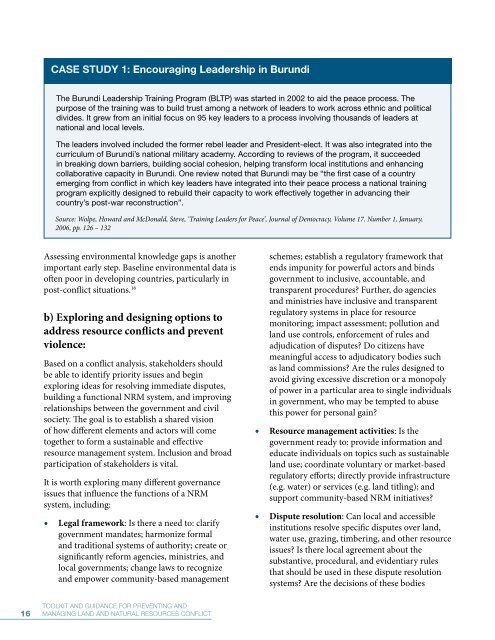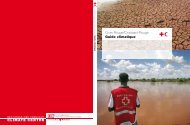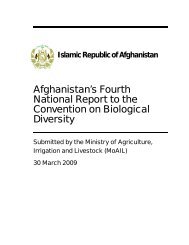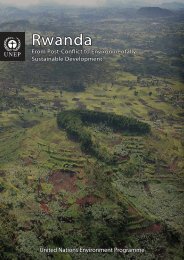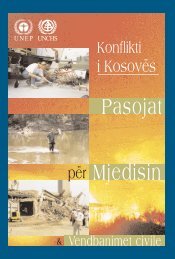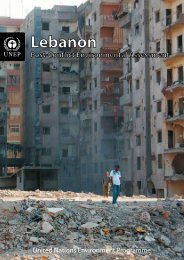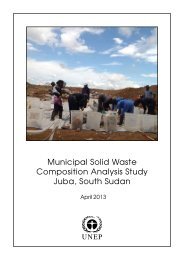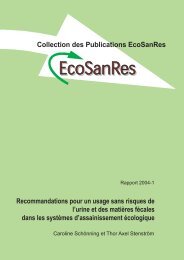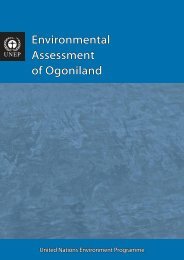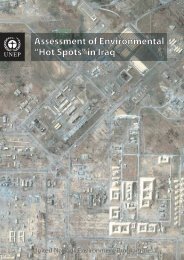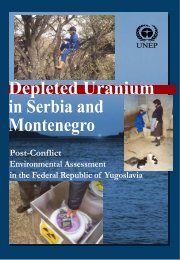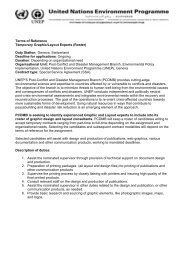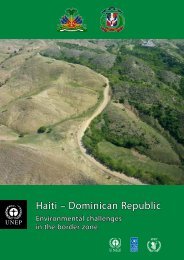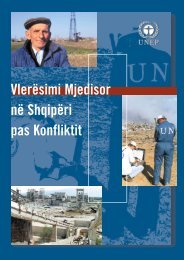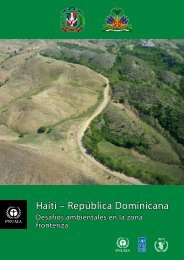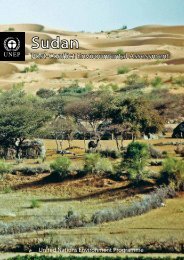Strengthening capacity - Disasters and Conflicts - UNEP
Strengthening capacity - Disasters and Conflicts - UNEP
Strengthening capacity - Disasters and Conflicts - UNEP
Create successful ePaper yourself
Turn your PDF publications into a flip-book with our unique Google optimized e-Paper software.
CASE STUDY 1: Encouraging Leadership in Burundi<br />
The Burundi Leadership Training Program (BLTP) was started in 2002 to aid the peace process. The<br />
purpose of the training was to build trust among a network of leaders to work across ethnic <strong>and</strong> political<br />
divides. It grew from an initial focus on 95 key leaders to a process involving thous<strong>and</strong>s of leaders at<br />
national <strong>and</strong> local levels.<br />
The leaders involved included the former rebel leader <strong>and</strong> President-elect. It was also integrated into the<br />
curriculum of Burundi’s national military academy. According to reviews of the program, it succeeded<br />
in breaking down barriers, building social cohesion, helping transform local institutions <strong>and</strong> enhancing<br />
collaborative <strong>capacity</strong> in Burundi. One review noted that Burundi may be “the first case of a country<br />
emerging from conflict in which key leaders have integrated into their peace process a national training<br />
program explicitly designed to rebuild their <strong>capacity</strong> to work effectively together in advancing their<br />
country’s post-war reconstruction”.<br />
Source: Wolpe, Howard <strong>and</strong> McDonald, Steve, ‘Training Leaders for Peace’, Journal of Democracy, Volume 17. Number 1, January,<br />
2006, pp. 126 – 132<br />
Assessing environmental knowledge gaps is another<br />
important early step. Baseline environmental data is<br />
often poor in developing countries, particularly in<br />
post-conflict situations. 16<br />
b) Exploring <strong>and</strong> designing options to<br />
address resource conflicts <strong>and</strong> prevent<br />
violence:<br />
Based on a conflict analysis, stakeholders should<br />
be able to identify priority issues <strong>and</strong> begin<br />
exploring ideas for resolving immediate disputes,<br />
building a functional NRM system, <strong>and</strong> improving<br />
relationships between the government <strong>and</strong> civil<br />
society. The goal is to establish a shared vision<br />
of how different elements <strong>and</strong> actors will come<br />
together to form a sustainable <strong>and</strong> effective<br />
resource management system. Inclusion <strong>and</strong> broad<br />
participation of stakeholders is vital.<br />
It is worth exploring many different governance<br />
issues that influence the functions of a NRM<br />
system, including:<br />
Legal framework: Is there a need to: clarify<br />
government m<strong>and</strong>ates; harmonize formal<br />
<strong>and</strong> traditional systems of authority; create or<br />
significantly reform agencies, ministries, <strong>and</strong><br />
local governments; change laws to recognize<br />
<strong>and</strong> empower community-based management<br />
schemes; establish a regulatory framework that<br />
ends impunity for powerful actors <strong>and</strong> binds<br />
government to inclusive, accountable, <strong>and</strong><br />
transparent procedures Further, do agencies<br />
<strong>and</strong> ministries have inclusive <strong>and</strong> transparent<br />
regulatory systems in place for resource<br />
monitoring; impact assessment; pollution <strong>and</strong><br />
l<strong>and</strong> use controls, enforcement of rules <strong>and</strong><br />
adjudication of disputes Do citizens have<br />
meaningful access to adjudicatory bodies such<br />
as l<strong>and</strong> commissions Are the rules designed to<br />
avoid giving excessive discretion or a monopoly<br />
of power in a particular area to single individuals<br />
in government, who may be tempted to abuse<br />
this power for personal gain<br />
Resource management activities: Is the<br />
government ready to: provide information <strong>and</strong><br />
educate individuals on topics such as sustainable<br />
l<strong>and</strong> use; coordinate voluntary or market-based<br />
regulatory efforts; directly provide infrastructure<br />
(e.g. water) or services (e.g. l<strong>and</strong> titling); <strong>and</strong><br />
support community-based NRM initiatives<br />
Dispute resolution: Can local <strong>and</strong> accessible<br />
institutions resolve specific disputes over l<strong>and</strong>,<br />
water use, grazing, timbering, <strong>and</strong> other resource<br />
issues Is there local agreement about the<br />
substantive, procedural, <strong>and</strong> evidentiary rules<br />
that should be used in these dispute resolution<br />
systems Are the decisions of these bodies<br />
16<br />
TOOLKIT AND GUIDANCE FOR PREVENTING AND<br />
MANAGING LAND AND NATURAL RESOURCES CONFLICT


